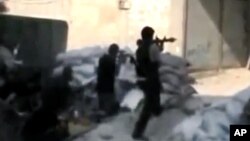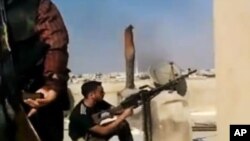Syria moved armored vehicles into the capital Damascus as opposition fighters battled Syrian government forces in what residents described as the fiercest fighting yet inside the capital.
One Syrian rebel fighter told the French News Agency the fighting is the "turning point" in the 17-month uprising against President Bashar al-Assad.
Activists said Monday the fighting had spread to several neighborhoods and into the center of the city.
Residents are fleeing neighborhoods under attack and government armored vehicles line the roads leading into and out of southern Damascus.
The spread of fighting came as U.N. peace mediator Kofi Annan was going to Moscow to meet Russian President Vladimir Putin, who has resisted Western calls to increase pressure on Assad.
Russian Foreign Minister Sergei Lavrov on Monday accused the West of using 'blackmail" to pressure Moscow into backing a stronger U.N. resolution against Syria. Lavrov said that tying the threat of sanctions to a measure that would extend the U.N. observer mission in Syria is a "dangerous approach."
He also rejected suggestions that Russia is protecting the Syrian president.
"Of course you've heard the mantra many times that Moscow holds the key to the Syrian solution," Lavrov said. "When we ask them what they mean by that, they tell us, 'you should convince Assad to resign on his own will.' But this is unrealistic, I've already said that."
"It is not a question of our allegiances, sympathies or dislikes," he said. "He will simply not go. Not because we defend him, but simply because he has a very, very substantial part of the population behind him.''
The U.N. Security Council is considering tough new sanctions on Syria, as a deadline looms for renewing its observer mission in the country. But Russia has threatened to once again veto any sanctions, saying it wants only to extend the observer mandate for three months.
"It is unacceptable to use monitors as a bargaining chip," Lavrov said.
UN fears crisis
Meanwhile, a top United Nations official warned Monday that many more Syrians will die if donors do not contribute added funds for humanitarian aid to Syria.
“We need more money," said John Ging, operations director for the U.N. Office for the Coordination of Humanitarian Affairs. "If we do not get more money, people will die and there will be more humanitarian suffering."
Ging said the Syrian government is generally honoring an agreement it signed with the United Nations six weeks ago to expand humanitarian aid.
He said aid agencies delivered food to 500,000 people last month. Ging said he expects aid to reach 850,000 people this month. But he said the gap between the needs and the means is widening.
The United Nations has appealed for $180 million for its humanitarian operations inside Syria. In addition, it is asking for $193 million to assist a growing number of refugees in neighboring countries. Each of these appeals is only 20 percent funded.
Humanitarian efforts are further hampered, Ging said, by the Syrian government's refusal to grant visas to international staff from nations its sees as hostile. He said the Syrian government will not issue visas to U.N. staff who are citizens of the United States, Canada, United Kingdom and France.
Civil war
The International Committee of the Red Cross says there is now a "non-international armed conflict" - or civil war - across more parts of Syria, widening its earlier designation.
The group had previously said such conflict existed between government forces and opposition groups in the flashpoint areas of Homs, Hama and Idlib. But ICRC spokesman Hicham Hassan said Sunday that hostilities have spread to other parts of Syria.
Hassan told VOA last month that a civil war designation is based on the intensity of the conflict and the organization of the armed groups and that it aims to give potential victims "the best protection possible."
He said international humanitarian law applies to any area where there is fighting between government forces and the opposition. That law spells out protections for civilians, saying they "shall not be the object of attack." Violations could lead to war crimes prosecutions.
Assad said last month his country was in a "state of war."
But the head of the opposition Syrian National Council, Abdul-Basset Sayda, told VOA's Kurdish service that anti-government groups are working to avoid a civil war and would like to see an internationally-backed peace plan work.
But those efforts so far, Dayda said, have been ineffective.
Lisa Schlein in Geneva and Jessica Golloher in Moscow contributed to this report. Some information was provided by AP, AFP and Reuters.
One Syrian rebel fighter told the French News Agency the fighting is the "turning point" in the 17-month uprising against President Bashar al-Assad.
Activists said Monday the fighting had spread to several neighborhoods and into the center of the city.
Residents are fleeing neighborhoods under attack and government armored vehicles line the roads leading into and out of southern Damascus.
The spread of fighting came as U.N. peace mediator Kofi Annan was going to Moscow to meet Russian President Vladimir Putin, who has resisted Western calls to increase pressure on Assad.
Russian Foreign Minister Sergei Lavrov on Monday accused the West of using 'blackmail" to pressure Moscow into backing a stronger U.N. resolution against Syria. Lavrov said that tying the threat of sanctions to a measure that would extend the U.N. observer mission in Syria is a "dangerous approach."
He also rejected suggestions that Russia is protecting the Syrian president.
"Of course you've heard the mantra many times that Moscow holds the key to the Syrian solution," Lavrov said. "When we ask them what they mean by that, they tell us, 'you should convince Assad to resign on his own will.' But this is unrealistic, I've already said that."
"It is not a question of our allegiances, sympathies or dislikes," he said. "He will simply not go. Not because we defend him, but simply because he has a very, very substantial part of the population behind him.''
The U.N. Security Council is considering tough new sanctions on Syria, as a deadline looms for renewing its observer mission in the country. But Russia has threatened to once again veto any sanctions, saying it wants only to extend the observer mandate for three months.
"It is unacceptable to use monitors as a bargaining chip," Lavrov said.
UN fears crisis
Meanwhile, a top United Nations official warned Monday that many more Syrians will die if donors do not contribute added funds for humanitarian aid to Syria.
“We need more money," said John Ging, operations director for the U.N. Office for the Coordination of Humanitarian Affairs. "If we do not get more money, people will die and there will be more humanitarian suffering."
Ging said the Syrian government is generally honoring an agreement it signed with the United Nations six weeks ago to expand humanitarian aid.
He said aid agencies delivered food to 500,000 people last month. Ging said he expects aid to reach 850,000 people this month. But he said the gap between the needs and the means is widening.
The United Nations has appealed for $180 million for its humanitarian operations inside Syria. In addition, it is asking for $193 million to assist a growing number of refugees in neighboring countries. Each of these appeals is only 20 percent funded.
Humanitarian efforts are further hampered, Ging said, by the Syrian government's refusal to grant visas to international staff from nations its sees as hostile. He said the Syrian government will not issue visas to U.N. staff who are citizens of the United States, Canada, United Kingdom and France.
Civil war
The International Committee of the Red Cross says there is now a "non-international armed conflict" - or civil war - across more parts of Syria, widening its earlier designation.
The group had previously said such conflict existed between government forces and opposition groups in the flashpoint areas of Homs, Hama and Idlib. But ICRC spokesman Hicham Hassan said Sunday that hostilities have spread to other parts of Syria.
Hassan told VOA last month that a civil war designation is based on the intensity of the conflict and the organization of the armed groups and that it aims to give potential victims "the best protection possible."
He said international humanitarian law applies to any area where there is fighting between government forces and the opposition. That law spells out protections for civilians, saying they "shall not be the object of attack." Violations could lead to war crimes prosecutions.
Assad said last month his country was in a "state of war."
But the head of the opposition Syrian National Council, Abdul-Basset Sayda, told VOA's Kurdish service that anti-government groups are working to avoid a civil war and would like to see an internationally-backed peace plan work.
But those efforts so far, Dayda said, have been ineffective.
Lisa Schlein in Geneva and Jessica Golloher in Moscow contributed to this report. Some information was provided by AP, AFP and Reuters.














